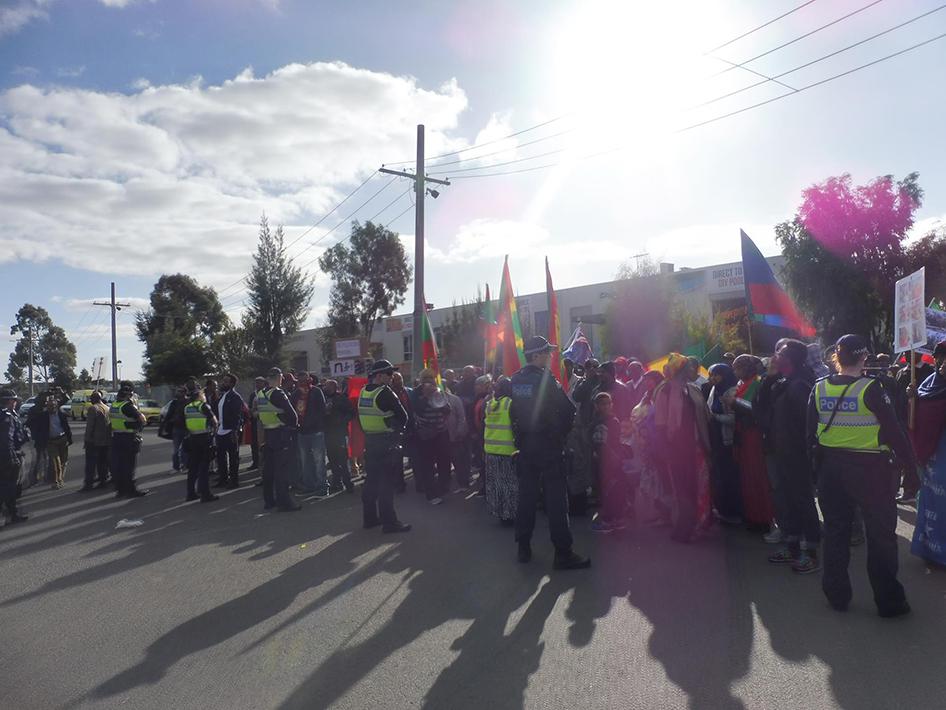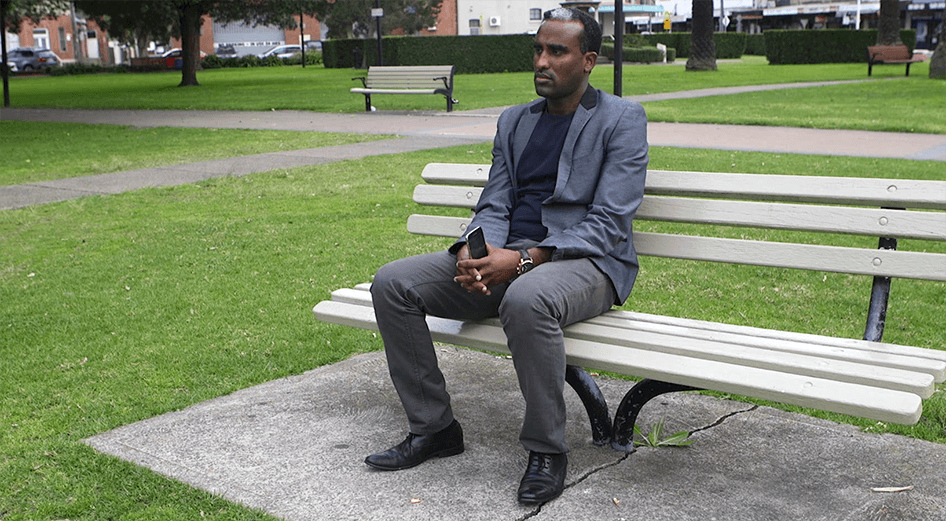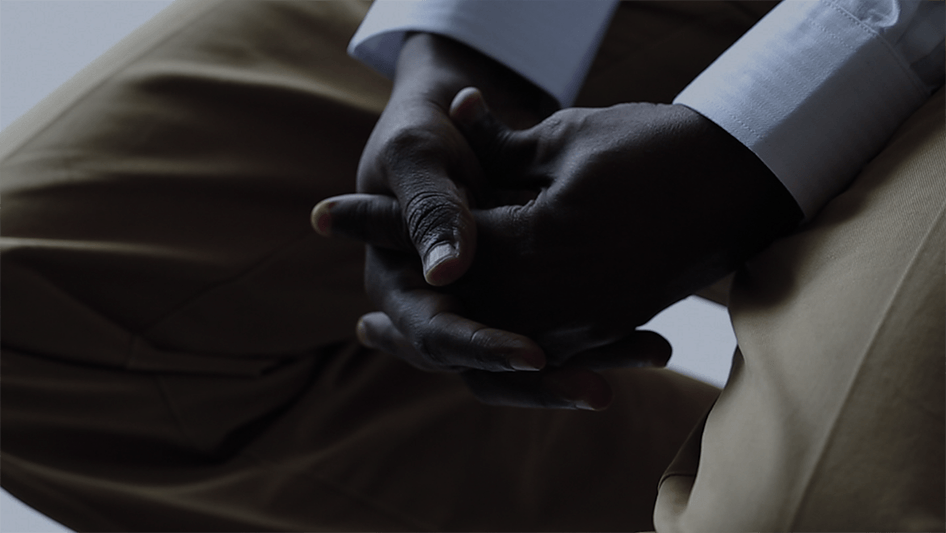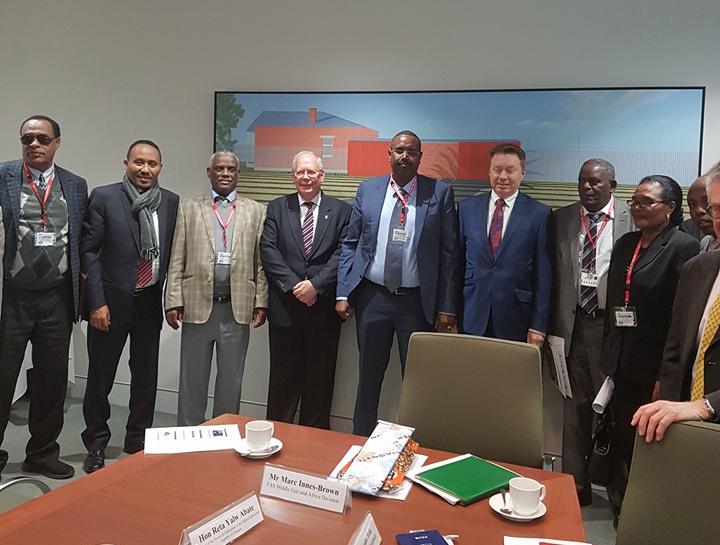(Sydney) – The Ethiopian government has arrested and detained dozens of relatives of Ethiopians who participated in a Melbourne protest in June, 2016, and is still holding many of them four months later, Human Rights Watch said today.
On June 12, members of Australia’s Ethiopian community who are from Somali Regional State protested the visit to Australia of an Ethiopian regional government delegation that included Abdi Mohamoud Omar, known as Abdi Iley, the president of Ethiopia’s Somali Regional State. They were also protesting Australia’s support for the Ethiopian government. The Ethiopian delegation did not appear, and after several hours the event was cancelled. The protesters later learned that several dozen of their relatives in Ethiopia’s Somali Regional State had been arrested and detained due to their involvement in the Melbourne protest.
 |
| Ethiopian Australians protest against an Ethiopian government delegation visiting Melbourne, Australia, June 2016. |
Human Rights Watch interviewed 10 members of the Ethiopian Somali community in Australia between July and September 2016.They told Human Rights Watch that at least 32 family members had been arrested in Ethiopia. Some have since been released but most were still in detention, the relatives said. The Ethiopian government should immediately release the relatives of the Melbourne protesters, whose detention amounts to unlawful collective punishment of family members, Human Rights Watch said.
Ethiopian Somali protesters in Melboune expressed particular concern over Abdi Mohamoud Omar’s visit. The Liyu police, a paramilitary unit that reports directly to Abdi Mohamoud Omar, has been responsible for numerous serious human rights abuses, including extrajudicial executions and torture. Australia’s Department of Foreign Affairs and Trade told Human Rights Watch that Abdi Mohamoud Omar’s visa application did not raise any serious concerns. The Australian government should ensure that foreign officials implicated in serious human rights abuses do not receive visas, Human Rights Watch said.
Numerous Ethiopian Somali Australians said that pro-government supporters living in Australia regularly harass community members perceived as government opponents. Several protesters said that these supporters called or personally confronted them in the days following the arrests and pressed them to make a video pledging support for Abdi Mohamoud Omar in order to secure the release of their relatives. At least three members of Australia’s Ethiopian Somali community have done this.
One man described pleas from his family members: “If you do not record something, they will kill us.”
Threatening demands for video apologies have been a regular tactic of the Somali Regional State government, Human Rights Watch said. People from Somali Regional State who live in the United States, Canada, and northern Europe have described similar networks and tactics by pro-government supporters there. These videos are often posted to the state-run broadcaster, ESTV, and to various pro-government websites.

Shukri, a Somali-Ethiopian Australian, who protested against the visit of Ethiopia’s President of the Somali Regional State, Abdi Mohamoud Omar, to Melbourne, Australia, in June 2016. In retaliation, Ethiopian paramilitary police rounded up members of Shukri’s family in Ethiopia.
“I don’t feel safe here,” one Australian said. “I thought I was safe. When I came, [I thought] now I will be in a free country. To be in Australia and be scared all the time, it doesn’t go together.”
One of the recently released detainees told his relative in Australia that security personnel hit him every night. His interrogators told him: “If you want to be released, you have to talk to [your relative] about support[ing] the government. You have to talk to people and then those people will take it to the embassy.” Arbitrary detention is commonplace in Somali Regional State, and detainees describe frequent torture and other ill-treatment in the region’s many detention sites.
Australia has a strong and growing economic relationship with Ethiopia, and Australian companies are exploring opportunities in Ethiopia in mining, energy, and agriculture. In July, an Australia trade delegation from the state of Victoria visited Ethiopia.
Granting a visa to Abdi Mohamoud Omar, who previously visited Australia in 2012, raises concerns about the Australian government’s vetting process of people implicated in serious rights abuses. The Department of Immigration and Border Protection is responsible for assessing visa applications and can refuse visas to people suspected of involvement in war crimes, crimes against humanity, and genocide. Given the significant evidence of war crimes and crimes against humanity by Ethiopian forces in the country in 2007-2008 while Abdi Mohamoud Omar was the Somali Regional State head of security, his visa application should have raised serious questions, Human Rights Watch said. However, Australian government officials told Human Rights Watch that Abdi Mohamoud Omar’s visa raised no red flags.
In response to a letter from Human Rights Watch, the Australian government wrote that “all non-citizens wishing to enter Australia are assessed against relevant public interest criteria, including foreign policy interest, national security and character requirements in accordance with relevant legislation. This includes foreign officials with potential character concerns or subject to allegations of human rights abuses.”

A Somali-Ethiopian Australian who protested against the visit of Ethiopia’s President of the Somali Regional State, Abdi Mohamoud Omar, to Melbourne, Australia, in June 2016. “My mother, brother, and sister were all arrested back home. It makes me sad. I was driving a taxi, but I cannot work now. I can’t answer the phone. I cannot sleep. All my family. It’s because of me.”
“Ethiopia has severely cracked down down on protests at home, but has gone a cruel step further by trying to silence Ethiopians protesting abroad by punishing their family members,” Horne said. “These relatives are being wrongfully held and should immediately be released.”

For additional information, please see below.
The Melbourne Protest
The generally peaceful protest on June 12 was marred by several scuffles, in which one man was injured, and the filming of protesters by government supporters. Several protesters said that a United States citizen connected to the Ethiopian ruling party, who was traveling with Abdi Mohamoud Omar, threatened protesters, saying “You will see what will happen to your relatives.” Another protester said that pro-government Ethiopian Australians threatened him at the event, saying, “You will see what happens.”
Several witnesses said that Ethiopian government supporters filmed them using smartphones, which would facilitate identifying their relatives in Somali Regional State. Within hours, protesters started receiving calls from family members in Ethiopia saying that relatives – some as old as 85 – had been arrested because of the Melbourne protest.
One protester said he later heard from his family: “When they [Liyu police] arrested my brothers, they told them, ‘Your brother is protesting and that’s why we are arresting you.’”
Another protester said, “Around 8 p.m. I got a phone call from my uncle back home. He said, ‘Two of your uncles were taken by the security and we don’t know where they went. … [I]t’s about you as they said your nephew did this or that to President Abdi Iley [Abdi Mohamoud Omar], that’s why.’ They took them away to jail.”
The 70-year-old mother of a protester was among those arrested. Before taking her to a military camp, the Liyu police asked her: “Are you the mother of [name withheld]? Your son created trouble for the [regional] president.” She was held for almost a month. She told her son that uniformed captors had beaten her in custody.

Ethiopian government delegation, led by Abdi Mohamoud Omar (center), meets with Australian government officials in Canberra, June 2016
Some other relatives of protesters, particularly the sick and the elderly, have also been released, but on the condition that their Australian relatives make a video apologizing to Abdi Mohamoud Omar for their “anti-government” behavior. Other relatives arrested following the protest remain in detention in various locations in Ethiopia’s Somali Regional State.
Conflict, Abuses in Ethiopia’s Somali Regional State
Ethiopia’s Somali Regional State, consisting largely of ethnic Somalis, has been the site of a low-level insurgency by the Ogaden National Liberation Front (ONLF) for more than 15 years. The ethnic Somali armed movement, largely supported by members of the Ogaden clan, has sought greater political autonomy for the region. Following the insurgent group’s April 2007 attack on an oil installation in Obole, which resulted in the deaths of 70 civilians and the capture of several Chinese oil workers, the Ethiopian government carried out a major counterinsurgency campaign incurring serious human rights abuses.
In 2008, Human Rights Watch found that security forces were involved in extrajudicial executions, torture, rape, and forced displacement of civilians. Human Rights Watch believes the Ethiopian National Defense Force and the insurgent group both committed war crimes between mid-2007 and early 2008, and that the military could be responsible for crimes against humanity. Abdi Mohamoud Omar was the head of security of Somali Regional State during this period.
Since 2008, the paramilitary Liyu police, who report directly to Abdi Mohamoud Omar, have frequently been accused of extrajudicial killings, torture, rape, and violence against civilians accused of supporting or being sympathetic to the ONLF, including in 2012 when the Liyu police summarily executed 10 civilans. Abdi Mohamoud Omar has been the president of Somali Regional State since 2010. Since 2008, a number of victims of government abuses have told Human Rights Watch that Abdi Mohamoud Omar was present during interrogations, ordering – and in some cases directly involved in – their torture and that he was present during executions of civilians.
One man detained in 2006 in a military camp told Human Rights Watch in July 2016:
When Abdi Iley [Abdi Mohamoud Omar] got frustrated that they [soldiers] did not do what he wanted then he did it himself. He would tell them to hit harder or take matters into his own hands. Abdi Iley [Abdi Mohamoud Omar] would say “You must confess.”
I was tortured. … We were handcuffed with our arms over our legs, with the legs pulled up. They would put a rod under our legs and hang us up so our head falls back and we hang upside down. I would be hung upside down for periods of 15 minutes and they would hit my buttocks and feet. It was very painful. They would keep us like this for 15 or 20 minutes.
Abdi Iley [Abdi Mohamoud Omar] was present for some of these interrogations when we were hanging upside down. The stick was like a rubber hose with an iron bar inside. Once, Abdi Iley[Abdi Mohamoud Omar] thought the officer was not hitting hard enough [so] he took an iron bar himself.
A number of people have also alleged that Abdi Mohamoud Omar threatened them on social media. Limitations on access to Ethiopia in general, and Somali Regional State specifically, have not made it possible to corroborate these claims.
The Ethiopian government has never meaningfully investigated abuses by the military or Liyu police in the Somali region. International human rights groups are not permitted access to to the area.
The government has used various tactics to silence the diaspora. Human Rights Watch has documented numerous examples in which family members of Ethiopians who have been vocal abroad were targeted for arrest or harassment. They have also been targeted for surveillance using European-made malware. Diaspora-based websites are often blocked inside Ethiopia, and the government regularly jams diaspora television and radio stations.

No comments:
Post a Comment